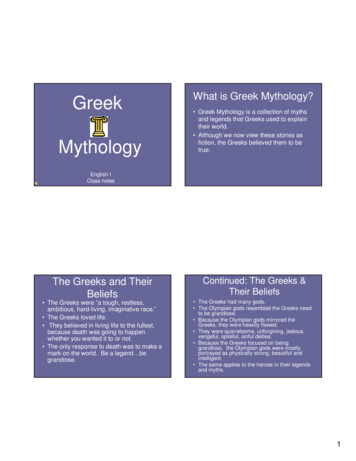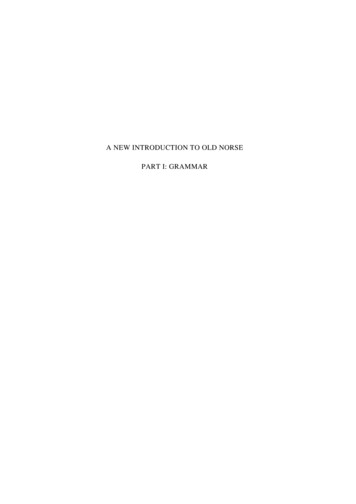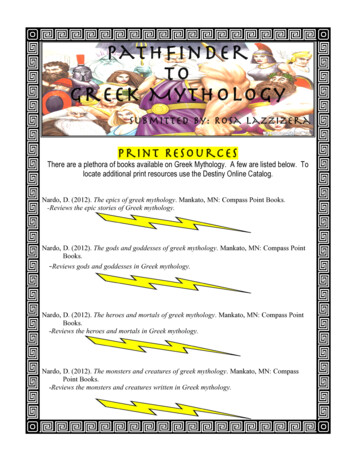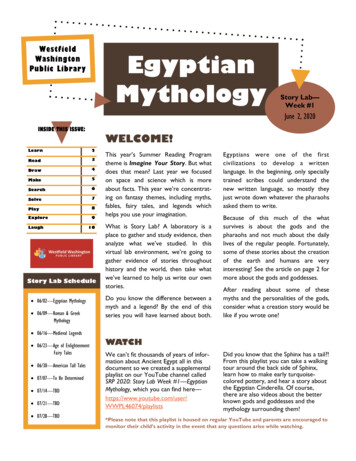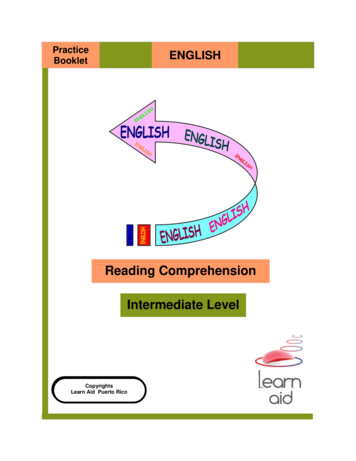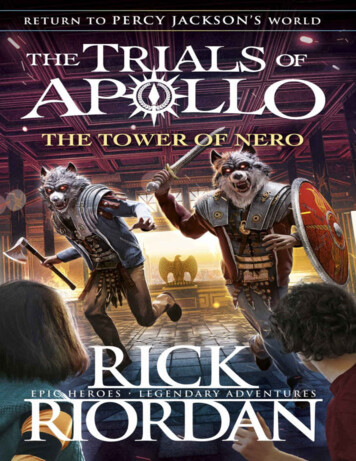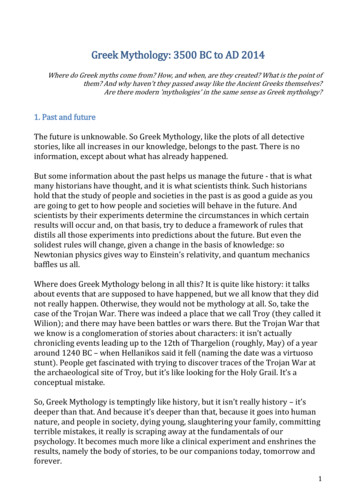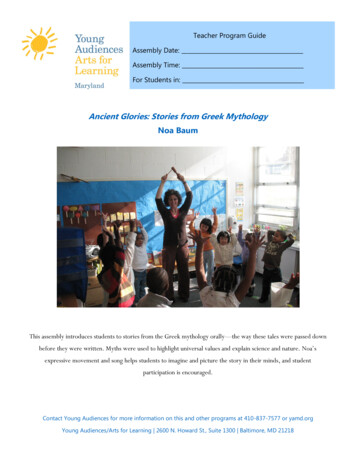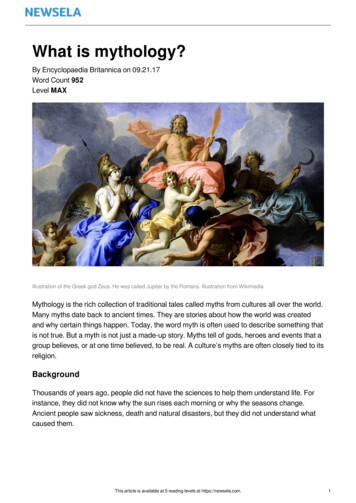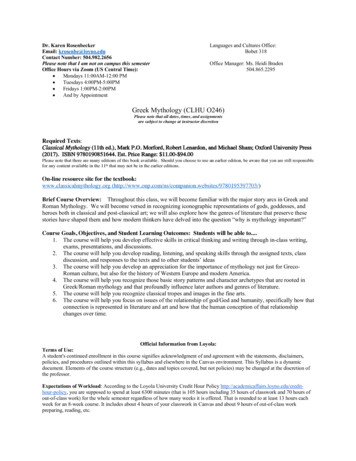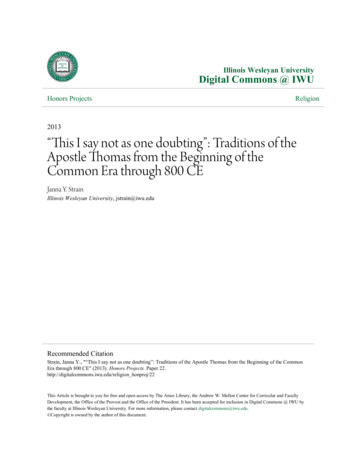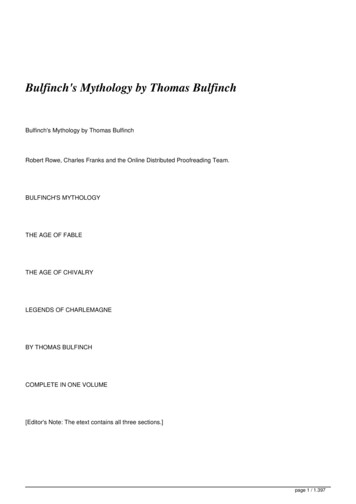
Transcription
Bulfinch's Mythology by Thomas BulfinchBulfinch's Mythology by Thomas BulfinchRobert Rowe, Charles Franks and the Online Distributed Proofreading Team.BULFINCH'S MYTHOLOGYTHE AGE OF FABLETHE AGE OF CHIVALRYLEGENDS OF CHARLEMAGNEBY THOMAS BULFINCHCOMPLETE IN ONE VOLUME[Editor's Note: The etext contains all three sections.]page 1 / 1.397
PUBLISHERS' PREFACENo new edition of Bulfinch's classic work can be consideredcomplete without some notice of the American scholar to whose wideerudition and painstaking care it stands as a perpetual monument."The Age of Fable" has come to be ranked with older books like"Pilgrim's Progress," "Gulliver's Travels," "The Arabian Nights,""Robinson Crusoe," and five or six other productions of world-widerenown as a work with which every one must claim some acquaintancebefore his education can be called really complete. Many readersof the present edition will probably recall coming in contact withthe work as children, and, it may be added, will no doubt discoverfrom a fresh perusal the source of numerous bits of knowledge thathave remained stored in their minds since those early years. Yetto the majority of this great circle of readers and students thename Bulfinch in itself has no significance.Thomas Bulfinch was a native of Boston, Mass., where he was bornin 1796. His boyhood was spent in that city, and he prepared forcollege in the Boston schools. He finished his scholastic trainingat Harvard College, and after taking his degree was for a period ateacher in his home city. For a long time later in life he wasemployed as an accountant in the Boston Merchants' Bank. Hisleisure time he used for further pursuit of the classical studieswhich he had begun at Harvard, and his chief pleasure in life layin writing out the results of his reading, in simple, condensedform for young or busy readers. The plan he followed in this work,page 2 / 1.397
to give it the greatest possible usefulness, is set forth in theAuthor's Preface."Age of Fable," First Edition, 1855; "The Age of Chivalry," 1858;"The Boy Inventor," 1860; "Legends of Charlemagne, or Romance ofthe Middle Ages," 1863; "Poetry of the Age of Fable," 1863;"Oregon and Eldorado, or Romance of the Rivers,"1860.In this complete edition of his mythological and legendary lore"The Age of Fable," "The Age of Chivalry," and "Legends ofCharlemagne" are included. Scrupulous care has been taken tofollow the original text of Bulfinch, but attention should becalled to some additional sections which have been inserted to addto the rounded completeness of the work, and which the publishersbelieve would meet with the sanction of the author himself, as inno way intruding upon his original plan but simply carrying it outin more complete detail. The section on Northern Mythology hasbeen enlarged by a retelling of the epic of the "Nibelungen Lied,"together with a summary of Wagner's version of the legend in hisseries of music-dramas. Under the head of "Hero Myths of theBritish Race" have been included outlines of the stories ofBeowulf, Cuchulain, Hereward the Wake, and Robin Hood. Of theverse extracts which occur throughout the text, thirty or morehave been added from literature which has appeared sinceBulfinch's time, extracts that he would have been likely to quotehad he personally supervised the new edition.page 3 / 1.397
Finally, the index has been thoroughly overhauled and, indeed,remade. All the proper names in the work have been entered, withreferences to the pages where they occur, and a conciseexplanation or definition of each has been given. Thus what was amere list of names in the original has been enlarged into a smallclassical and mythological dictionary, which it is hoped willprove valuable for reference purposes not necessarily connectedwith "The Age of Fable."Acknowledgments are due the writings of Dr. Oliver Huckel forinformation on the point of Wagner's rendering of the Nibelungenlegend, and M. I. Ebbutt's authoritative volume on "Hero Myths andLegends of the British Race," from which much of the informationconcerning the British heroes has been obtainedAUTHOR'S PREFACEIf no other knowledge deserves to be called useful but that whichhelps to enlarge our possessions or to raise our station insociety, then Mythology has no claim to the appellation. But ifthat which tends to make us happier and better can be calleduseful, then we claim that epithet for our subject. For Mythologyis the handmaid of literature; and literature is one of the bestallies of virtue and promoters of happiness.page 4 / 1.397
Without a knowledge of mythology much of the elegant literature ofour own language cannot be understood and appreciated. When Byroncalls Rome "the Niobe of nations," or says of Venice, "She looks aSea-Cybele fresh from ocean," he calls up to the mind of onefamiliar with our subject, illustrations more vivid and strikingthan the pencil could furnish, but which are lost to the readerignorant of mythology. Milton abounds in similar allusions. Theshort poem "Comus" contains more than thirty such, and the ode "Onthe Morning of the Nativity" half as many. Through "Paradise Lost"they are scattered profusely. This is one reason why we often hearpersons by no means illiterate say that they cannot enjoy Milton.But were these persons to add to their more solid acquirements theeasy learning of this little volume, much of the poetry of Miltonwhich has appeared to them "harsh and crabbed" would be found"musical as is Apollo's lute." Our citations, taken from more thantwenty-five poets, from Spenser to Longfellow, will show howgeneral has been the practice of borrowing illustrations frommythology.The prose writers also avail themselves of the same source ofelegant and suggestive illustration. One can hardly take up anumber of the "Edinburgh" or "Quarterly Review" without meetingwith instances. In Macaulay's article on Milton there are twentysuch.But how is mythology to be taught to one who does not learn itpage 5 / 1.397
through the medium of the languages of Greece and Rome? To devotestudy to a species of learning which relates wholly to falsemarvels and obsolete faiths is not to be expected of the generalreader in a practical age like this. The time even of the young isclaimed by so many sciences of facts and things that little can bespared for set treatises on a science of mere fancy.But may not the requisite knowledge of the subject be acquired byreading the ancient poets in translations? We reply, the field istoo extensive for a preparatory course; and these verytranslations require some previous knowledge of the subject tomake them intelligible. Let any one who doubts it read the firstpage of the "Aeneid," and see what he can make of "the hatred ofJuno," the "decree of the Parcae," the "judgment of Paris," andthe "honors of Ganymede," without this knowledge.Shall we be told that answers to such queries may be found innotes, or by a reference to the Classical Dictionary? We reply,the interruption of one's reading by either process is so annoyingthat most readers prefer to let an allusion pass unapprehendedrather than submit to it. Moreover, such sources give us only thedry facts without any of the charm of the original narrative; andwhat is a poetical myth when stripped of its poetry? The story ofCeyx and Halcyone, which fills a chapter in our book, occupies buteight lines in the best (Smith's) Classical Dictionary; and so ofothers.page 6 / 1.397
Our work is an attempt to solve this problem, by telling thestories of mythology in such a manner as to make them a source ofamusement. We have endeavored to tell them correctly, according tothe ancient authorities, so that when the reader finds themreferred to he may not be at a loss to recognize the reference.Thus we hope to teach mythology not as a study, but as arelaxation from study; to give our work the charm of a story-book,yet by means of it to impart a knowledge of an important branch ofeducation. The index at the end will adapt it to the purposes ofreference, and make it a Classical Dictionary for the parlor.Most of the classical legends in "Stories of Gods and Heroes" arederived from Ovid and Virgil. They are not literally translated,for, in the author's opinion, poetry translated into literal proseis very unattractive reading. Neither are they in verse, as wellfor other reasons as from a conviction that to translatefaithfully under all the embarrassments of rhyme and measure isimpossible. The attempt has been made to tell the stories inprose, preserving so much of the poetry as resides in the thoughtsand is separable from the language itself, and omitting thoseamplifications which are not suited to the altered form.The Northern mythological stories are copied with some abridgmentfrom Mallet's "Northern Antiquities." These chapters, with thoseon Oriental and Egyptian mythology, seemed necessary to completethe subject, though it is believed these topics have not usuallypage 7 / 1.397
been presented in the same volume with the classical fables.The poetical citations so freely introduced are expected to answerseveral valuable purposes. They will tend to fix in memory theleading fact of each story, they will help to the attainment of acorrect pronunciation of the proper names, and they will enrichthe memory with many gems of poetry, some of them such as are mostfrequently quoted or alluded to in reading and conversation.Having chosen mythology as connected with literature for ourprovince, we have endeavored to omit nothing which the reader ofelegant literature is likely to find occasion for. Such storiesand parts of stories as are offensive to pure taste and goodmorals are not given. But such stories are not often referred to,and if they occasionally should be, the English reader need feelno mortification in confessing his ignorance of them.Our work is not for the learned, nor for the theologian, nor forthe philosopher, but for the reader of English literature, ofeither sex, who wishes to comprehend the allusions so frequentlymade by public speakers, lecturers, essayists, and poets, andthose which occur in polite conversation.In the "Stories of Gods and Heroes" the compiler has endeavored toimpart the pleasures of classical learning to the English reader,by presenting the stories of Pagan mythology in a form adapted topage 8 / 1.397
modern taste. In "King Arthur and His Knights" and "TheMabinogeon" the attempt has been made to treat in the same way thestories of the second "age of fable," the age which witnessed thedawn of the several states of Modern Europe.It is believed that this presentation of a literature which heldunrivalled sway over the imaginations of our ancestors, for manycenturies, will not be without benefit to the reader, in additionto the amusement it may afford. The tales, though not to betrusted for their facts, are worthy of all credit as pictures ofmanners; and it is beginning to be held that the manners and modesof thinking of an age are a more important part of its historythan the conflicts of its peoples, generally leading to no result.Besides this, the literature of romance is a treasure-house ofpoetical material, to which modern poets frequently resort. TheItalian poets, Dante and Ariosto, the English, Spenser, Scott, andTennyson, and our own Longfellow and Lowell, are examples of this.These legends are so connected with each other, so consistentlyadapted to a group of characters strongly individualized inArthur, Launcelot, and their compeers, and so lighted up by thefires of imagination and invention, that they seem as well adaptedto the poet's purpose as the legends of the Greek and Romanmythology. And if every well-educated young person is expected toknow the story of the Golden Fleece, why is the quest of theSangreal less worthy of his acquaintance? Or if an allusion to theshield of Achilles ought not to pass unapprehended, why should onepage 9 / 1.397
to Excalibar, the famous sword of Arthur?--"Of Arthur, who, to upper light restored,With that terrific sword,Which yet he brandishes for future war,Shall lift his country's fame above the polar star."[Footnote: Wordsworth]It is an additional recommendation of our subject, that it tendsto cherish in our minds the idea of the source from which wesprung. We are entitled to our full share in the glories andrecollections of the land of our forefathers, down to the time ofcolonization thence. The associations which spring from thissource must be fruitful of good influences; among which not theleast valuable is the increased enjoyment which such associationsafford to the American traveller when he visits England, and setshis foot upon any of her renowned localities.The legends of Charlemagne and his peers are necessary to completethe subject.In an age when intellectual darkness enveloped Western Europe, aconstellation of brilliant writers arose in Italy. Of these, Pulci(born in 1432), Boiardo (1434), and Ariosto (1474) took for theirpage 10 / 1.397
subjects the romantic fables which had for many ages beentransmitted in the lays of bards and the legends of monkishchroniclers. These fables they arranged in order, adorned with theembellishments of fancy, amplified from their own invention, andstamped with immortality. It may safely be asserted that as longas civilization shall endure these productions will retain theirplace among the most cherished creations of human genius.In "Stories of Gods and Heroes," "King Arthur and His Knights" and"The Mabinogeon" the aim has been to supply to the modern readersuch knowledge of the fables of classical and mediaeval literatureas is needed to render intelligible the allusions which occur inreading and conversation. The "Legends of Charlemagne" is intendedto carry out the same design. Like the earlier portions of thework, it aspires to a higher character than that of a piece ofmere amusement. It claims to be useful, in acquainting its readerswith the subjects of the productions of the great poets of Italy.Some knowledge of these is expected of every well-educated youngperson.In reading these romances, we cannot fail to observe how theprimitive inventions have been used, again and again, bysuccessive generations of fabulists. The Siren of Ulysses is theprototype of the Siren of Orlando, and the character of Circereappears in Alcina. The fountains of Love and Hatred may betraced to the story of Cupid and Psyche; and similar effectsproduced by a magic draught appear in the tale of Tristram andpage 11 / 1.397
Isoude, and, substituting a flower for the draught, inShakspeare's "Midsummer Night's Dream." There are many otherinstances of the same kind which the reader will recognize withoutour assistance.The sources whence we derive these stories are, first, the Italianpoets named above; next, the "Romans de Chevalerie" of the Comtede Tressan; lastly, certain German collections of popular tales.Some chapters have been borrowed from Leigh Hunt's Translationsfrom the Italian Poets. It seemed unnecessary to do over againwhat he had already done so well; yet, on the other hand, thosestories could not be omitted from the series without leaving itincomplete.THOMAS BULFINCH.CONTENTSSTORIES OF GODS AND HEROESI. IntroductionII. Prometheus and PandoraIII. Apollo and Daphne--Pyramus and Thisbe--Cephalus and ProcrisIV. Juno and her Rivals, Io and Callisto--Diana and Actaeon--Latona and the Rusticspage 12 / 1.397
V. PhaetonVI. Midas--Baucis and PhilemonVII. Proserpine--Glaucus and ScyllaVIII. Pygmalion--Dryope--Venus and Adonis--Apollo and HyacinthusIX. Ceyx and HalcyoneX. Vertumnus and Pomona--Iphis and AnaxareteXI. Cupid and PsycheXII. Cadmus--The MyrmidonsXIII. Nisus and Scylla--Echo and Narcissus--Clytie--Hero and LeanderXIV. Minerva and Arachne--NiobeXV. The Graeae and Gorgons--Perseus and Medusa--Atlas--AndromedaXVI. Monsters: Giants--Sphinx--Pegasus and Chimaera--Centaurs--Griffin--PygmiesXVII. The Golden Fleece--MedeaXVIII. Meleager and AtalantaXIX. Hercules--Hebe and GanymedeXX. Theseus and Daedalus--Castor and Pollux--Festivals and GamesXXI. Bacchus and AriadneXXII. The Rural Deities--The Dryads and Erisichthon--Rhoecus--Water Deities--Camenae--WindsXXIII. Achelous and Hercules--Admetus and Alcestis--Antigone--PenelopeXXIV. Orpheus and syas--Melampus--MusaeusXXV. Arion--Ibycus--Simonides--SapphoXXVI. Endymion--Orion--Aurora and Tithonus--Acis and GalateaXXVII. The Trojan WarXXVIII. The Fall of Troy--Return of the Greeks--Orestes and ElectraXXIX. Adventures of Ulysses--The Lotus-eaters--The Cyclopespage 13 / 1.397
--Circe--Sirens--Scylla and Charybdis--CalypsoXXX. The Phaeacians--Fate of the SuitorsXXXI. Adventures of Aeneas--The Harpies--Dido--PalinurusXXXII. The Infernal Regions--The SibylXXXIII. Aeneas in Italy--Camilla--Evander--Nisus and Euryalus--Mezentius--TurnusXXXIV. Pythagoras--Egyptian Deities--OraclesXXXV. Origin of Mythology--Statues of Gods and Goddesses--Poets of MythologyXXXVI. Monsters (modern)--The Phoenix--Basilisk--Unicorn--SalamanderXXXVII. Eastern Mythology--Zoroaster--Hindu Mythology--Castes--Buddha--The Grand Lama--Prester JohnXXXVIII. Northern Mythology--Valhalla--The ValkyriorXXXIX. Thor's Visit to JotunheimXL. The Death of Baldur--The Elves--Runic Letters--Skalds--Iceland--Teutonic Mythology--The Nibelungen Lied--Wagner's Nibelungen RingXLI. The Druids--IonaKING ARTHUR AND HIS KNIGHTSI. IntroductionII. The Mythical History of EnglandIII. MerlinIV. ArthurV. Arthur (Continued)VI. Sir Gawainpage 14 / 1.397
VII. Caradoc Briefbras; or, Caradoc with the Shrunken ArmVIII. Launcelot of the LakeIX. The Adventure of the CartX. The Lady of ShalottXI. Queen Guenever's PerilXII. Tristram and IsoudeXIII. Tristram and Isoude (Continued)XIV. Sir Tristram's Battle with Sir LauncelotXV. The Round TableXVI. Sir PalamedesXVII. Sir TristramXVIII. PercevalXIX. The Sangreal, or Holy GraalXX. The Sangreal (Continued)XXI. The Sangreal (Continued)XXII. Sir Agrivain's TreasonXXIII. Morte d'ArthurTHE MABINOGEONIntroductory NoteI. The BritonsII. The Lady of the FountainIII. The Lady of the Fountain (Continued)IV. The Lady of the Fountain (Continued)V. Geraint, the Son of ErbinVI. Geraint, the Son of Erbin (Continued)page 15 / 1.397
VII. Geraint, the Son of Erbin (Continued)VIII. Pwyll, Prince of DyvedIX. Branwen, the Daughter of LlyrX. ManawyddanXI. Kilwich and OlwenXII. Kilwich and Olwen (Continued)XIII. TaliesinHERO MYTHS OF THE BRITISH RACEBeowulfCuchulain, Champion of IrelandHereward the WakeRobin HoodLEGENDS OF CHARLEMAGNEIntroductionThe Peers, or PaladinsThe TournamentThe Siege of AlbraccaAdventures of Rinaldo and OrlandoThe Invasion of FranceThe Invasion of France (Continued)page 16 / 1.397
Bradamante and RogeroAstolpho and the EnchantressThe OrcAstolpho's Adventures continued, and Isabella's begun.MedoroOrlando MadZerbino and IsabellaAstolpho in AbyssiniaThe War in AfricaRogero and BradamanteThe Battle of RoncesvallesRinaldo and BayardDeath of RinaldoHuon of BordeauxHuon of Bordeaux (Continued)Huon of Bordeaux (Continued)Ogier, the DaneOgier, the Dane (Continued)Ogier, the Dane (Continued)GLOSSARYSTORIES OF GODS AND HEROESCHAPTER Ipage 17 / 1.397
INTRODUCTIONThe religions of ancient Greece and Rome are extinct. The socalled divinities of Olympus have not a single worshipper amongliving men. They belong now not to the department of theology, butto those of literature and taste. There they still hold theirplace, and will continue to hold it, for they are too closelyconnected with the finest productions of poetry and art, bothancient and modern, to pass into oblivion.We propose to tell the stories relating to them which have comedown to us from the ancients, and which are alluded to by modernpoets, essayists, and orators. Our readers may thus at the sametime be entertained by the most charming fictions which fancy hasever created, and put in possession of information indispensableto every one who would read with intelligence the elegantliterature of his own day.In order to understand these stories, it will be necessary toacquaint ourselves with the ideas of the structure of the universewhich prevailed among the Greeks--the people from whom theRomans, and other nations through them, received their science andreligion.The Greeks believed the earth to be flat and circular, their ownpage 18 / 1.397
country occupying the middle of it, the central point being eitherMount Olympus, the abode of the gods, or Delphi, so famous for itsoracle.The circular disk of the earth was crossed from west to east anddivided into two equal parts by the Sea, as they called theMediterranean, and its continuation the Euxine, the only seas withwhich they were acquainted.Around the earth flowed the River Ocean, its course being fromsouth to north on the western side of the earth, and in a contrarydirection on the eastern side. It flowed in a steady, equablecurrent, unvexed by storm or tempest. The sea, and all the riverson earth, received their waters from it.The northern portion of the earth was supposed to be inhabited bya happy race named the Hyperboreans, dwelling in everlasting blissand spring beyond the lofty mountains whose caverns were supposedto send forth the piercing blasts of the north wind, which chilledthe people of Hellas (Greece). Their country was inaccessible byland or sea. They lived exempt from disease or old age, from toilsand warfare. Moore has given us the "Song of a Hyperborean,"beginning"I come from a land in the sun-bright deep,Where golden gardens glow,page 19 / 1.397
Where the winds of the north, becalmed in sleep,Their conch shells never blow."On the south side of the earth, close to the stream of Ocean,dwelt a people happy and virtuous as the Hyperboreans. They werenamed the Aethiopians. The gods favored them so highly that theywere wont to leave at times their Olympian abodes and go to sharetheir sacrifices and banquets.On the western margin of the earth, by the stream of Ocean, lay ahappy place named the Elysian Plain, whither mortals favored bythe gods were transported without tasting of death, to enjoy animmortality of bliss. This happy region was also called the"Fortunate Fields," and the "Isles of the Blessed."We thus see that the Greeks of the early ages knew little of anyreal people except those to the east and south of their owncountry, or near the coast of the Mediterranean. Their imaginationmeantime peopled the western portion of this sea with giants,monsters, and enchantresses; while they placed around the disk ofthe earth, which they probably regarded as of no great width,nations enjoying the peculiar favor of the gods, and blessed withhappiness and longevity.The Dawn, the Sun, and the Moon were supposed to rise out of theOcean, on the eastern side, and to drive through the air, givingpage 20 / 1.397
light to gods and men. The stars, also, except those forming theWain or Bear, and others near them, rose out of and sank into thestream of Ocean. There the sun-god embarked in a winged boat,which conveyed him round by the northern part of the earth, backto his place of rising in the east. Milton alludes to this in his"Comus":"Now the gilded car of dayHis golden axle doth allayIn the steep Atlantic stream,And the slope Sun his upward beamShoots against the dusky pole,Pacing towards the other goalOf his chamber in the east"The abode of the gods was on the summit of Mount Olympus, inThessaly. A gate of clouds, kept by the goddesses named theSeasons, opened to permit the passage of the Celestials to earth,and to receive them on their return. The gods had their separatedwellings; but all, when summoned, repaired to the palace ofJupiter, as did also those deities whose usual abode was theearth, the waters, or the underworld. It was also in the greathall of the palace of the Olympian king that the gods feasted eachday on ambrosia and nectar, their food and drink, the latter beinghanded round by the lovely goddess Hebe. Here they conversed ofthe affairs of heaven and earth; and as they quaffed their nectar,Apollo, the god of music, delighted them with the tones of hispage 21 / 1.397
lyre, to which the Muses sang in responsive strains. When the sunwas set, the gods retired to sleep in their respective dwellings.The following lines from the "Odyssey" will show how Homerconceived of Olympus:"So saying, Minerva, goddess azure-eyed,Rose to Olympus, the reputed seatEternal of the gods, which never stormsDisturb, rains drench, or snow invades, but calmThe expanse and cloudless shmes with purest day.There the inhabitants divine rejoiceForever"--Cowper.The robes and other parts of the dress of the goddesses were wovenby Minerva and the Graces and everything of a more solid naturewas formed of the various metals. Vulcan was architect, smith,armorer, chariot builder, and artist of all work in Olympus. Hebuilt of brass the houses of the gods; he made for them the goldenshoes with which they trod the air or the water, and moved fromplace to place with the speed of the wind, or even of thought. Healso shod with brass the celestial steeds, which whirled thechariots of the gods through the air, or along the surface of thesea. He was able to bestow on his workmanship self-motion, sothat the tripods (chairs and tables) could move of themselves inand out of the celestial hall. He even endowed with intelligencepage 22 / 1.397
the golden handmaidens whom he made to wait on himself.Jupiter, or Jove (Zeus [Footnote: The names included inparentheses are the Greek, the others being the Roman or Latinnames] ), though called the father of gods and men, had himself abeginning. Saturn (Cronos) was his father, and Rhea (Ops) hismother. Saturn and Rhea were of the race of Titans, who were thechildren of Earth and Heaven, which sprang from Chaos, of which weshall give a further account in our next chapter.There is another cosmogony, or account of the creation, accordingto which Earth, Erebus, and Love were the first of beings. Love(Eros) issued from the egg of Night, which floated on Chaos. Byhis arrows and torch he pierced and vivified all things, producinglife and joy.Saturn and Rhea were not the only Titans. There were others, whosenames were Oceanus, Hyperion, Iapetus, and Ophion, males; andThemis, Mnemosyne, Eurynome, females. They are spoken of as theelder gods, whose dominion was afterwards transferred to others.Saturn yielded to Jupiter, Oceanus to Neptune, Hyperion to Apollo.Hyperion was the father of the Sun, Moon, and Dawn. He istherefore the original sun-god, and is painted with the splendorand beauty which were afterwards bestowed on Apollo."Hyperion's curls, the front of Jove himself"page 23 / 1.397
--Shakspeare.Ophion and Eurynome ruled over Olympus till they were dethroned bySaturn and Rhea. Milton alludes to them in "Paradise Lost." Hesays the heathens seem to have had some knowledge of thetemptation and fall of man."And fabled how the serpent, whom they calledOphion, with Eurynome, (the wideEncroaching Eve perhaps,) had first the ruleOf high Olympus, thence by Saturn driven."The representations given of Saturn are not very consistent; foron the one hand his reign is said to have been the golden age ofinnocence and purity, and on the other he is described as amonster who devoured his children. [Footnote: This inconsistencyarises from considering the Saturn of the Romans the same with theGrecian deity Cronos (Time), which, as it brings an end to allthings which have had a beginning, may be said to devour its ownoffspring] Jupiter, however, escaped this fate, and when grown upespoused Metis (Prudence), who administered a draught to Saturnwhich caused him to disgorge his children. Jupiter, with hisbrothers and sisters, now rebelled against their father Saturn andhis brothers the Titans; vanquished them, and imprisoned some ofthem in Tartarus, inflicting other penalties on others. Atlas waspage 24 / 1.397
condemned to bear up the heavens on his shoulders.On the dethronement of Saturn, Jupiter with his brothers Neptune(Poseidon) and Pluto (Dis) divided his dominions. Jupiter'sportion was the heavens, Neptune's the ocean, and Pluto's therealms of the dead. Earth and Olympus were common property.Jupiter was king of gods and men. The thunder was his weapon, andhe bore a shield called Aegis, made for him by Vulcan. The eaglewas his favorite bird, and bore his thunderbolts.Juno (Hera) was the wife of Jupiter, and queen of the gods. Iris,the goddess of the rainbow, was her attendant and messenger. Thepeacock was her favorite bird.Vulcan (Hephaestos), the celestial artist, was the son of Jupiterand Juno. He was born lame, and his mother was so displeased atthe sight of him that she flung him out of heaven. Other accountssay that Jupiter kicked him out for taking part with his mother ina quarrel which occurred between them. Vulcan's lameness,according to this account, was the consequence of his fall. He wasa whole day falling, and at last alighted in the island of Lemnos,which was thenceforth sacred to him. Milton alludes to this storyin "Paradise Lost," Book I.:". From mornTo noon he fell, from noon to dewy eve,page 25 / 1.397
A summer's day; and with the setting sunDropped from the zenith, like a falling star,On Lemnos, the Aegean isle."Mars (Ares), the god of war, was the son of Jupiter and Juno.Phoebus Apollo, the god of archery, prophecy, and music, was theson of Jupiter and Latona, and brother of Diana (Artemis). He wasgod of the sun, as Diana, his sister, was the goddess of the moon.Venus (Aphrodite), the goddess of love and beauty, was thedaughter of Jupiter and Dione. Others say that Venus sprang fromthe foam of the sea. The zephyr wafted her along the waves to theIsle of Cyprus, where she was received and attired by the Seasons,and then led to the assembly of the gods. All were charmed withher beauty, and each one demanded her for his wife. Jupiter gaveher to Vulc
stories of mythology in such a manner as to make them a source of amusement. We have endeavored to tell them correctly, according to the ancient authorities, so that when the reader finds them referred to he may not be at a loss to recognize the reference. Thus we hope to teach mythology not as a study, but as a
